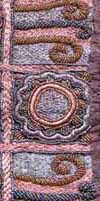2. AUTOCRATS FROM ASIA
The officers at the head of
the new department were at a loss to know how I had entered the Transvaal.
They inquired of the Indians who used to go to them, but these could say
nothing definite. The officers only ventured a guess that I might have
succeeded in entering without a permit on the strength of my old connections.
If that was the case, I was liable to be arrested!
It is a general practice, on
the termination of a big war, to invest the government of the day with
special powers. This was the case in South Africa. The govenment had passed
a Peace Preservation Ordinance, which provided that anyone entering the
Transvaal without a permit should be liable to arrest and imprisonment.
The question of arresting me under this provision was mooted, but no one
could summon up courage enough to ask me to produce my permit.
The officers had of course sent
telegrams to Durban, and when they found that I had entered with a permit,
they were disappointed. But they were not the men to be defeated by such
disappointment. Though I had succeeded in entering the Transvaal, they
could still successfully prevent me from waiting on Mr. Chamberlain.
So the community was asked to
submit the names of the representatives who were to form the deputation.
Colour prejudice was of course in evidence everywhere in South Africa,
but I was not prepared to find here the dirty and underhand dealing among
officials that I was familiar with in India. In South Africa the public
departments were maintained for the good of the people and were responsible
to public opinion. Hence officials in charge had a certain courtesy of
manner and humility about them, and coloured people also got the benefit
of it more or less. With the coming of the officers from Asia, came also
its autocracy, and the habits that the autocrat had imbibed there. In South
Africa there was a kind of responsible government or democracy, whereas
the commodity imported from Asia was autocracy pure and simple; for the
Asiatics had no responsible government, there being a foreign power governing
them. In South Africa the Europeans were settled emigrants. They had become
South African citizens and had control over the departmental officers.
But the autocrats from Asia now appeared on the scene, and the Indians
in consequence found themselves between the devil and the deep sea.
I had a fair taste of this autocracy.
I was first summoned to see the chief of the department, an officer from
Ceylon. Lest I should appear to exaggerate when I say that I was 'summoned'
to see the chief, I shall make myself clear. No written order was sent
to me. Indian leaders often had to visit the Asiatic officers. Among these
was the late Sheth Tyeb Haji Khanmahomed. The chief of the office asked
him who I was and why I had come there.
'He is our adviser,' said Tyeb
Sheth, 'and he has come here at our request.'
'Then what are we here for?
Have we not been appointed to protect you? What can Gandhi know of the
conditions here?' asked the autocrat.
Tyeb Sheth answered the charge
as best he could: 'Of course you are there. But Gandhi is our man. He knows
our language and understands us. You are after all officials.'
The Sahib ordered Tyeb Sheth
to fetch me before him. I went to the Sahib in company with Tyeb Sheth
and others. No seats were offered, we were all kept standing.
'What brings you here?' said
the Sahib, addressing me.
'I have come here at the request
of my fellow-countrymen, to help them with my advice,' I replied.
'But don't you know that you
have no right to come here? The permit you hold was given you by mistake.
You cannot be regarded as a domiciled Indian. You must go back. You shall
not wait on Mr. Chamberlain. It is for the protection of the Indians here
that the Asiatic Department has been especially created. Well, you may
go.' With this he bade me good-bye, giving me no opportunity for a reply.
But he detained my companions.
He gave them a sound scolding and advised them to send me away.
They returned chagrined. We
were now confronted with an unexpected situation.

